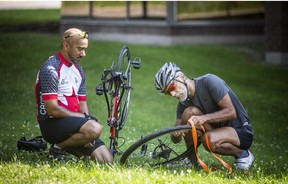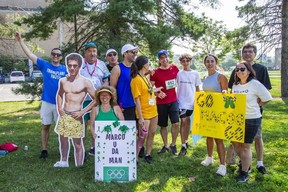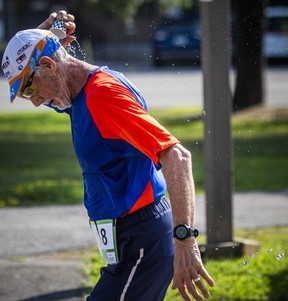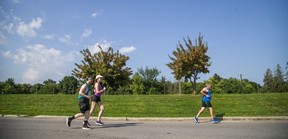The Canadian Transplant Games began on Saturday and run until next Friday at Carleton University, with competitions at venues around the city including cycling, running, triathlon, track and field, pickleball, golf, bowling, table tennis, swimming, lawn bowls and pétanque.
One goal is to bring the transplant community together to talk about their experiences, and another is to raise awareness of organ donation among the general public, said Brenda Brown, president of the Canadian Transplant Society.
Article Contents
For example, Brown received a kidney 11 years ago as part of a three-way exchange after her daughter volunteered to donate it. Without that, Brown was told she might have had to wait 10 years to receive a kidney from a deceased donor.
Sylvie Charbonneau's son, Benoit, a competitive swimmer, was in his mid-20s when he learned his kidney function had declined by about 25%. After three years on a special diet, he soon had to choose between dialysis or a kidney transplant. Sylvie donated her kidney to her son in 2012, and he returned to work four weeks after the operation.
“When you see someone lose something, you realize how precious it is,” Silvie says. “Before the surgery he was getting weaker and weaker, but he never missed a day of work. After the transplant he was full of energy and back to normal.”
But by 2021, the donated kidney had stopped working and Benoit was put on a waiting list to receive a kidney from a deceased donor in January 2022. He will compete in the World Transplant Games in Perth, Australia in 2023, where he hopes to win five medals.

For Sylvie, it's moving to see people celebrating their second chance at life, and for Benoit, now 42, it's good to be among people for whom he is no exception, she said.
“He made friends that will remain lifelong friends.”
The tournament in Canada is held every two years but was suspended during the COVID-19 pandemic because immune-compromised transplant patients are unable to travel.
In 2017, the Canada Games added an event for living donors and their families.
Of the 190 competitors registered for the Ottawa event, 124 are organ transplant recipients. The rest are donor families, living donors and advocates.
Brown said some of her competitors have had second or third transplants, and while life expectancy after organ donation is typically seven to 15 years, she knows a man who had his first kidney transplant 50 years ago.
Article Contents

In 2023, 3,428 organ transplants were performed in Canada, 83 percent of which were from deceased donors. Of the organs donated by living donors, 54 percent were from related donors, Brown said. There are 4,700 people waiting for an organ transplant in Canada. About three-quarters of those are waiting for a kidney transplant.
About 15 years ago, exercise wasn't encouraged for organ transplant patients, Brown said, but now there's evidence that exercise is good for transplanted organs.
Heather Lannon, originally from Newfoundland and Labrador, and her husband, Jamie Wilkinson, moved to Toronto in 2014 while he was waiting for a heart transplant, and attended their first game together in 2016. Wilkinson underwent a heart transplant in 2017, but died from complications days later.

For Lannon, what she learned on that trip helped define a new career direction: She is now a social worker specializing in transplant and cardiac care.
“The sense of community is so important. Even if you're not an athlete, it gives you a chance to connect with people and talk to people who donate,” said Lannon, a volunteer for the 2024 Games.
“These are very positive people. They are starting a second life and living it to the fullest. We have athletes in their late 70s who have had two or three transplants and are still training hard.”
Lannon knows a woman in her 40s who received a liver about 20 years ago from a deceased donor who is now 109 years old. “That liver was supposed to be temporary,” she said.
For Lannon, the match will be bittersweet.
“I wish Jamie was here and could be at these events. I've been thinking about him a lot this week,” she said, “but I feel safe in this community. People really understand.”
Our website is the place to go for the latest news, so be sure to bookmark our homepage. and sign Sign up for our newsletter to stay up to date with the latest news.
Editor's recommendation



Share this article on social networks

